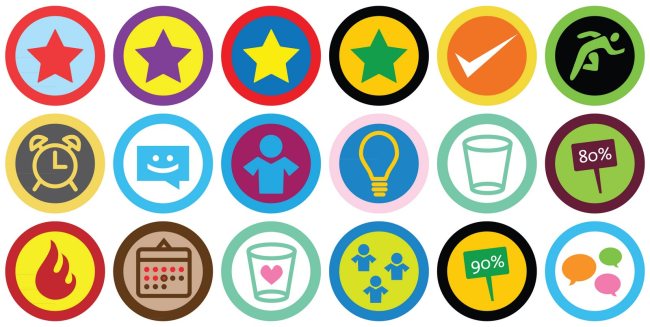Monsters in the Sky: Facing Jesse Schell’s Nightmare of Over-Gamification

“And what will that world be like? Well, I think it’ll be like this: You’ll get up in the morning to brush your teeth, and the toothbrush can sense that you’re brushing your teeth, and so, hey, good job for you! 10 points for brushing your teeth! … And who cares? The toothpaste company, the toothbrush company; the more you brush, the more toothpaste you use, they have a vested financial interest.” – Jesse Schell
In 2010, noted game designer Jesse Schell gave a talk at the DICE Summit that promptly scared the crap out of everybody. Titled “When games invade real life,” Schell extrapolated out the direction that social games and gamified reward systems had been going in to Orwellian proportions, complete with benevolent overlords rewarding our good deeds with pats on the head and the constant awareness of being judged by our peers.
Nearly three years later, the trends he identified are advancing eerily fast – with more corporate-sponsored gamification programs, deployments of game mechanics intended to direct consumer behavior and gamified systems embedded in conventional games coming by the day.
So have we already lost the game? Will psychological tricks, employed against the masses in the name of capitalism, annihilate free will as we know it?
Thankfully, the answer is not that simple.
“The main thing is planning for the future. Because that’s part of the weather. But your plans for the future are probably futile.” – William Anderson, Weamon Project Lead
To describe Weamon as a PvE game would be an understatement. Combining Pokémon’s well-honed monster training mechanics with a weather checking app, Index Interactive’s Weamon pits players in a never-ending battle against AI monsters aligned with rain, fog, clouds, sun, and so on. 
For example: Use a sun-type monster on a bright summer day and you’ll gain temporary boosts, while using the same monster in the middle of a downpour nets negative effects. (The game, in development for iOS, is currently running a Kickstarter campaign for funding.)
In the late 90s, I had gotten hooked playing a game with a similar take on Pokémon, only instead of fighting monsters hiding in weather, you found them hiding in URLs. The game, NetMonster, never achieved anything beyond a cult following, though I fondly remember hours spent hunched over our brand new Gateway2000 Pentium 133hz computing machine, trawling through links for the next great foe.
Speaking to Weamon project lead William Anderson and game designer Ben Hayes, my nostalgia wavered into concern at points where their game intersected with reality. Support for real-time weather events will guarantee players a seamless experience, I was told, even for rare cases like volcano eruptions. But do you really want to be the guy with his phone out fighting imaginary monsters while a wave of liquid magma gently rolls down and pats you on the back?
“So there’s a lot of psychological cleverness going on with these things (games) … There’s something else these have in common, not just these psychological tricks. What these all have in common is they are all busting through to reality.” – Jesse Schell
Well, no. Index is well aware of the absurdity of this scenario, and seems to have a solution of sorts worked out that boils down to something you could call respect for the user.
Index, primarily a digital design agency, has taken the focus on user experience beyond smooth menus and intuitive UI. For their first game, concentrating on a shorter, streamlined experience means foregoing both invasive social media nag screens and artificial attempts to lengthen the average play session in favor of simplicity and respect for the user’s time.
“It’s ‘I’m checking the weather and I’m fighting some monsters.’ It’s not ‘I’m playing Weamon and fighting monsters for 8 hours.’” – William Anderson, Weamon Project Lead
If there are any psychological tricks at work in Weamon, they come counter to Schell’s vision of a dystopian future – and this is where things get interesting. Since the core of the game’s systems rely so much on known weather patterns, Anderson found himself becoming an amateur meteorologist simply by developing and testing the game.
And, as any respectable RPG min-maxer could tell you, the rewards offered by mastering the game would surely be worth the effort to spend five minutes learning what exactly makes a nor’easter different from a tropical storm, or just how fast wind has to be blowing during a snowstorm to classify as a blizzard.
Is it such a leap to imagine similar mechanics helping teach kids about weather events, airstreams, global warming, or even sparking general curiosity about what goes on in other parts of the world?
“And so it could be that these systems are just all crass commercialization and it’s terrible, but it’s possible that they’ll inspire us to be better people – if the game systems are designed right.” – Jesse Schell
Gamification of real life is still in its infancy. As the first generation of these experiences transitions to more balanced iterations in line with a rising quality bar, as opposed to shoddy yet novel distractions, it becomes clearer that the responsibility for making sure Schell’s disturbing vision doesn’t come true lies with those who will design the gamified systems of the future. Looking at it from this perspective, the free market can function as a check against abuse of the system’s power.

“(Gamification) sort of becomes an arms race, and you assume that everyone (every company) who survives will have it,” says Hayes. “Once everyone has it, people will do something else.”
And there is no shortage of people doing something else. Google is not far away from making a major Augmented Reality play with Project Glass and the recently-announced territory-based AR game/app/thingy Ingress. Hybrid car manufacturers are increasing the complexity of their in-dash virtual pet-style games to encourage more fuel-efficient driving. Even blood donation clinics like the New York Blood Center offer rewards points for donors, directing behavior with bonuses for certain days and donation types.
Like most real-world dilemmas, the answer here is not a binary choice but a neutral reality. Like any tool or weapon, gamification must be handled with respect and a thorough understanding of its effects on humanity.
Maybe Schell knew the answer all along, and through the use of a cautionary tale, simply wanted to pass on the information through a shared experience.
If so – well played, indeed.
